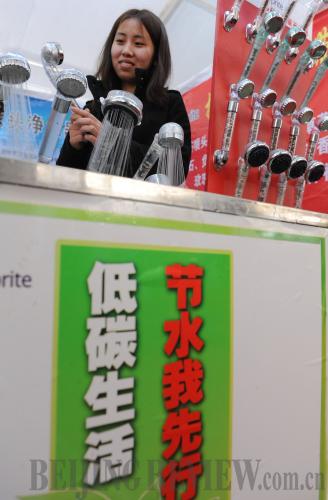|
 |
|
SAVING WATER: Water-saving taps in a shopping mall in Beijing, a city that has reduced the annual water consumption from 4 billion to 3.46 billion cubic meters between 2001 and 2009 (CFP) |
Li Xiao is a little disappointed there has been no snow as January draws to a close. The Beijing born and raised woman had planned to go to the Forbidden City with her boyfriend to have photos taken in the snow.
"It's little unusual not seeing any snow falling in winter because I grew up here, which makes me feel it's drier than before," she said.
Li's suspicions are correct. When different areas of the country had already had snowfall, it didn't show up in Beijing. Weather experts said such a snow-less situation hasn't occurred for 22 years in the capital city.
Water authorities are even more anxious than the weather department. Until January 20, Beijing had experienced its second-longest dry spell in history—88 days. Between October 2008 and February 2009, Beijing had no precipitation for more than 100 days.
The city is growing even thirstier.
Chronic shortage
There has been 12 consecutive years of drought in Beijing since 1999, according to the Beijing Water Authority. It's roughly estimated that the decreased amount of rainfall over the past 12 years would add up to 20 billion cubic meters. The per-capita annual amount of water resources in Beijing has been nearly halved to about 210 cubic meters, one 10th of the national average level and one 40th of the world level.
Beijing heavily depends on rain and snowfall for its water supplies as there are no big rivers running through the city, said Guo Wenli, Director of the Climate Center of the Beijing Meteorological Bureau. Normally the rainfall during the rainy season in June through August contributes to one third of the whole year, but the city's average precipitation in the rainy season of 2010 stood at 52 mm, just 25 percent of the average level of normal years.
Though there was some rain in October, it barely relieved the situation. "From a weather point of view, the city's water stock mostly relies on the strong rainfall in summer," said Guo.
Statistics from water authorities show Beijing consumes 3.5 billion cubic meters of water on average every year and its water shortage will reach 400 million cubic meters before the water diverted from the south is available for use here in 2014. The ongoing South-to-North Water Diversion Project will pump 1 billion cubic meters from the Yangtze River each year to Beijing.
It's reported currently two thirds of Beijing's daily water supply is sourced from underground water. The excessive use of underground water has led to the descent of the underground water level to an average of 30 meters.
It took millions of years to form the abundance of underground water, said water expert Wang Jian. Underground water is supposed to be reserved for war and should not be used until critical situations occur. But Beijing is overspending strategic resources.
The underlying reasons
With nearly 20 million residents and more than 4.7 million vehicles, Beijing's water resources deficit is the result of decrease in natural rainfall and unreasonable urban expansion, said Wang.
Though the city has reduced the annual water demand from 4 billion to 3.5 billion cubic meters through multiple ways of industrial upgrading and restructuring and all means of water conservation, Wang says the city's fast expansion has offset the aforementioned efforts.
Wang is worried because the city's area is expected to reach 1,652 square km in 2020 from 109 square km in 1949, and such a swelling city will keep pressuring its water supplies.
The city's fast-growing population, which is estimated to hit 25 million by 2020, is also to be blamed for the current "water crisis." The Beijing Municipal Government has always been active in controlling the urban population but its efforts proved unsuccessful and the fundamental reason is population control should be focused on the original sources of incoming population, says Hou Dongmin, a professor in population, resources and environmental economics at Renmin University of China.
| 